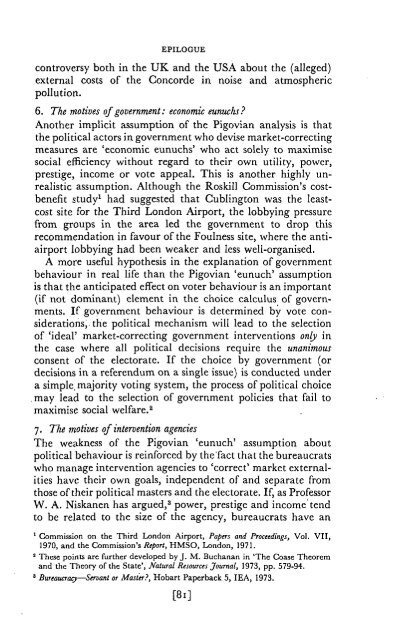THE MYTH OF SOCIAL COST.pdf - Institute of Economic Affairs
THE MYTH OF SOCIAL COST.pdf - Institute of Economic Affairs
THE MYTH OF SOCIAL COST.pdf - Institute of Economic Affairs
Create successful ePaper yourself
Turn your PDF publications into a flip-book with our unique Google optimized e-Paper software.
EPILOGUE<br />
controversy both in the UK and the USA about the (alleged)<br />
external costs <strong>of</strong> the Concorde in noise and atmospheric<br />
pollution.<br />
6. The motives <strong>of</strong> government: economic eunuchs?<br />
Another implicit assumption <strong>of</strong> the Pigovian analysis is that<br />
the political actors in government who devise market-correcting<br />
measures are 'economic eunuchs' who act solely to maximise<br />
social efficiency without regard to their own utility, power,<br />
prestige, income or vote appeal. This is another highly unrealistic<br />
assumption. Although the Roskill Commission's costbenefit<br />
study 1 had suggested that Cublington was the leastcost<br />
site for the Third London Airport, the lobbying pressure<br />
from groups in the area led the government to drop this<br />
recommendation in favour <strong>of</strong> the Foulness site, where the antiairport<br />
lobbying had been weaker and less well-organised.<br />
A more useful hypothesis in the explanation <strong>of</strong> government<br />
behaviour in real life than the Pigovian 'eunuch' assumption<br />
is that the anticipated effect on voter behaviour is an important<br />
(if not dominant) element in the choice calculus <strong>of</strong> governments.<br />
If government behaviour is determined by vote considerations,,<br />
the political mechanism will lead to the selection<br />
<strong>of</strong> 'ideal' market-correcting government interventions only in<br />
the case where all political decisions require the unanimous<br />
consent <strong>of</strong> the electorate. If the choice by government (or<br />
decisions in a referendum on a single issue) is conducted under<br />
a simple, majority voting system, the process <strong>of</strong> political choice<br />
. may lead to the selection <strong>of</strong> government policies that fail to<br />
maximise social welfare. 2<br />
7. The motives <strong>of</strong> intervention agencies<br />
The weakness <strong>of</strong> the Pigovian 'eunuch' assumption about<br />
political behaviour is reinforced by the'fact that the bureaucrats<br />
who manage intervention agencies to 'correct' market externalities<br />
have their own goals, independent <strong>of</strong> and separate from<br />
those <strong>of</strong> their political masters and the electorate. If, as Pr<strong>of</strong>essor<br />
W. A. Niskanen has argued, 3 power, prestige and income tend<br />
to be related to the size <strong>of</strong> the agency, bureaucrats have an<br />
1 Commission on the Third London Airport, Papers and Proceedings, Vol. VII,<br />
1970, and the Commission's Report, HMSO, London, 1971.<br />
2 These points are further developed by J. M. Buchanan in 'The Coase Theorem<br />
and the Theory <strong>of</strong>the State', Natural Resources Journal, 1973, pp. 579-94.<br />
3 Bureaucracy—Servant or Master?, Hobart Paperback 5, IEA, 1973.<br />
[81]












